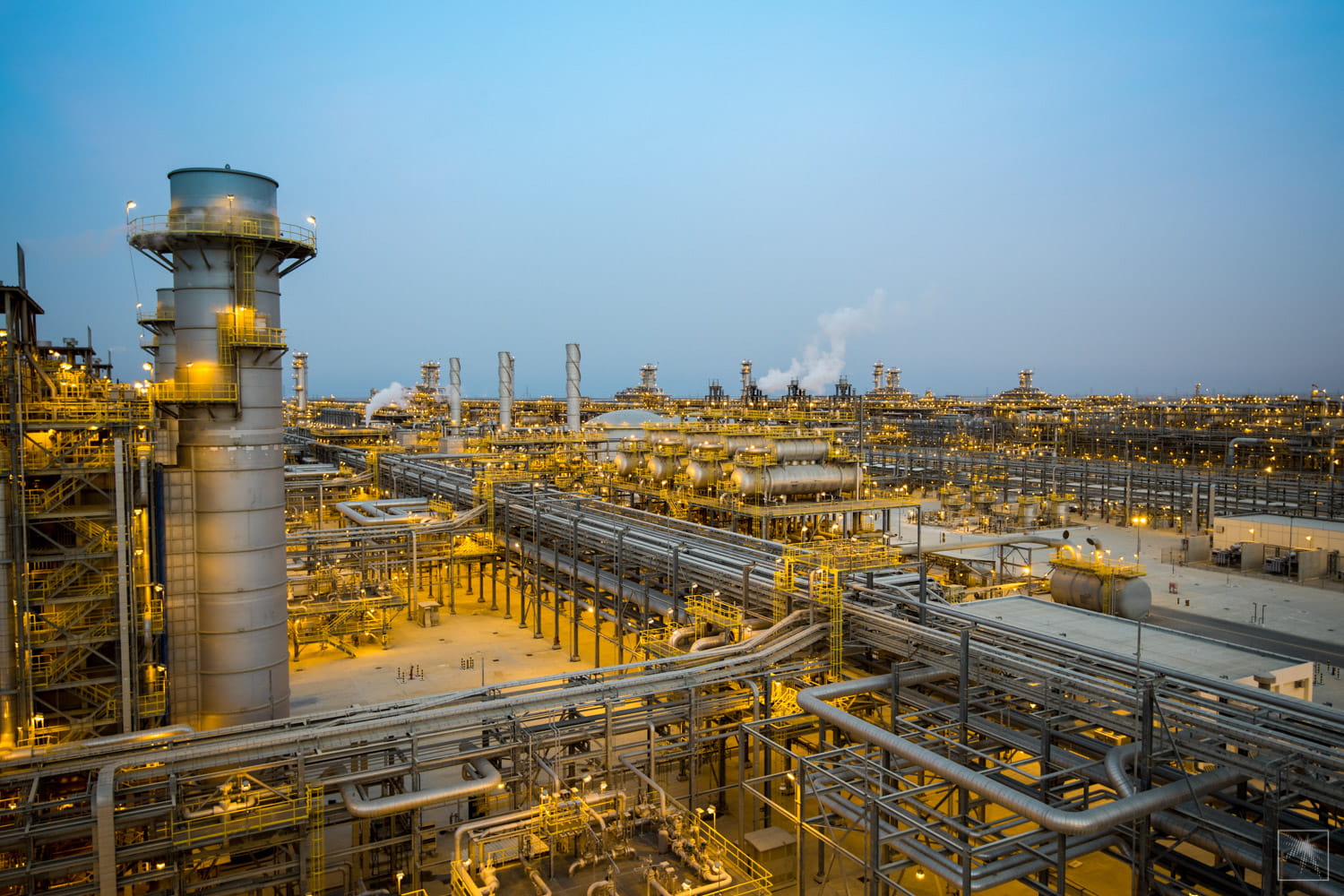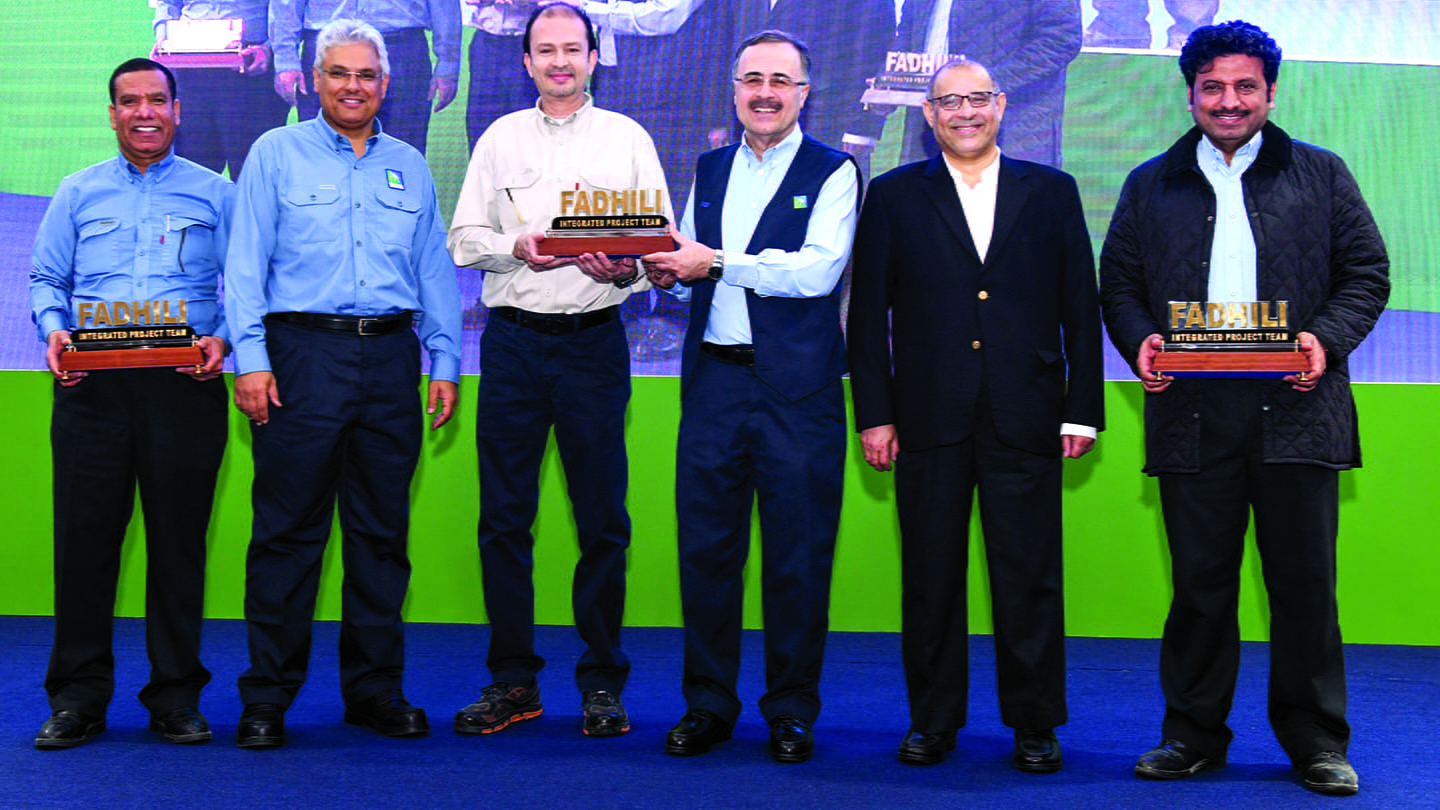
MEGA PROJECTS
Fadhili Gas Plant
Fadhili Gas Plant (FGP) represents a significant increase in the company’s gas processing capacity.
Aramco’s commitment
Fadhili Gas Plant (FGP) represents a significant milestone in the company’s gas processing capabilities.
The program reflects Aramco’s commitment to increase supplies of cleaner-burning natural gas, reduce emissions, and free up more crude oil for value-added refining and export. It is also an enabler for Saudi Arabia’s vision to reduce its domestic dependency on oil burning to generate power, by increasing our production of sales gas to 12.2 billion scfd.
Driving growth, enabling industry, reducing emissions
Fadhili is the first plant to treat nonassociated gas from both onshore and offshore fields, and the first Aramco plant designed from the start to use Tail Gas Treatment technology. This allows it to achieve a sulfur recovery rate of more than 99.9%.
The Fadhili Gas Plant reached its design gas processing capacity of 2.5 bscfd in 2021 and as part of the company’s Master Gas System (MGS) will help to meet Saudi Arabia’s growing demand for energy.
"This plant will not only drive economic growth, it is enabling industrial development and also reducing emissions in the process."
Aramco President and CEO, Amin Nasser

Aramco President and CEO Amin Nasser and other executives recognize Fadhili Gas Plants Projects manager Hisham U. Derhalli and other members of his team at a 2020 ceremony.
Implementation of the Capital Management System (CMS)
One of the key enablers for success of the Fadhili project was the implementation of the Capital Management System (CMS).
The CMS enabled the project team to increase their efficient use of capital, and when benchmarked against peers in the industry and similar projects, Fadhili was delivered at a lower comparative cost.
The program recorded more than 210 million safe construction hours. This safety success was achieved by implementing a stringent safety program with more than 25,000 workers involved at the peak of the construction.
Massive procurement efforts were made throughout the program, contributing to the local economy by placing 46% of the purchase orders with local vendors.
Fadhili
Saudi Aramco and Dow begin talks on a world-scale chemicals joint venture.
Different types of gas from different fields
With its five gas treatment trains — an interconnected series of systems that process, purify and convert the gas as it passes through them — Fadhili is one of the first gas plants designed to process two different types of gas from two different fields — Hasbah Offshore and Khursaniyah Onshore.
While both the Hasbah and Khursaniyah fields produce nonassociated gas, the gas from Khursaniyah has a lower energy content than the gas from Hasbah. So, while the 2 billion scfd of gas from Hasbah is processed to supply sales gas to the MGS, the lower energy gas from Khursaniyah is sent to an adjacent combined heat and power (CHP) plant at Fadhili, co-owned by Saudi Aramco, Saudi Electricity Company, and Engie. The CHP plant has a capacity of 1.5 gigawatts (gWs) partially for company use, with the remainder supplied to the Saudi national power grid.
Fadhili key facts
300,000
cubic meters of concrete used in construction
9,000
kilometers of cables used
4,500
permenant jobs created for Saudis in construction companies
1,700
pieces of equipment installed
210
million safe man-hours
100,000
tons of strucural steel used in construction
Leading in sulfur recovery
With six sulfur recovery trains, Fadhili is the first Aramco gas plant designed to achieve a minimum of 99.9% sulfur recovery, protecting air quality.
Reducing CO2 emissions and energy consumption
In another first, a unique technology was deployed in Fadhili, utilizing turbochargers to reduce energy consumption by 55 gWs per year.
This was not only the first installation in a Company facility, but also the first use of this technology in the oil and gas industry worldwide.
A turbocharger utilizes the high pressure of the incoming gas stream and converts it to mechanical energy that drives our circulation pumps. This results in a significant reduction in our facility’s energy requirements, reducing our carbon footprint and freeing-up power for other users.
These turbocharged pumps also offer significant environmental benefits, reducing CO2 emissions by 60 tons per year compared to previously used systems.
Apply safety standards
Fadhili project planners were also careful to make sure that the most stringent safety standards were applied through all phases of the project. Project safety officials conducted three major safety initiatives to guide and monitor safe work practices at the worksite. That attention to detail paid major dividends.